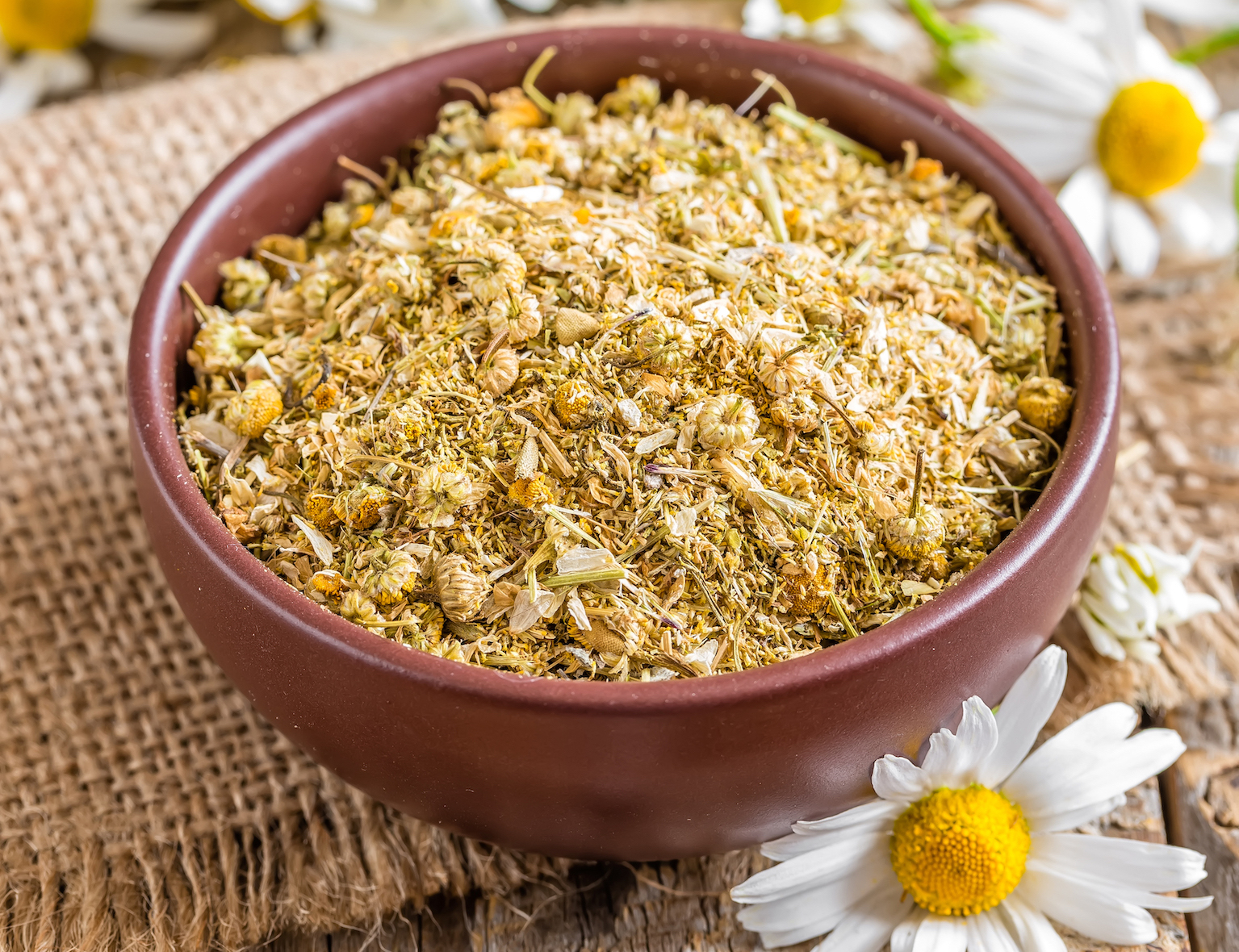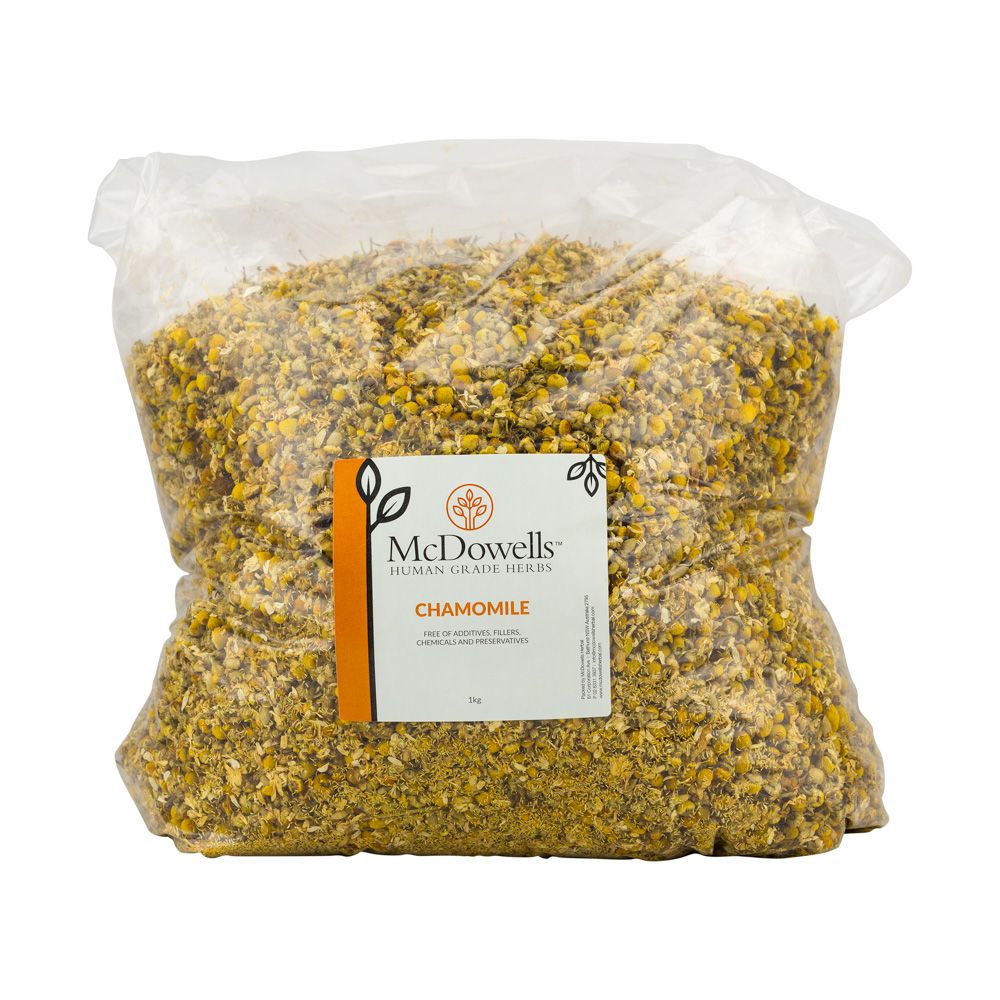Chamomile is one of the most widely used flowers for herbal tea. Chamomile tea is so popular, it is found in most grocery stores in the tea aisle. It is used as a mild sedative, and is good for insomnia as well as many other nervous conditions. It is nervine and sedative especially suited to teething children and those who have been in a highly emotional state over a long period of time. Except for a very small risk of allergy to the daisy family, Chamomile is also one of the safest herbs to use. It is safe for even the youngest baby.

Chamomile has many properties and helps various conditions ranging from skin and nervous system problems to acting as an antispasmodic and a digestive aid.
Chamomile is often used to treat colic, scours and other gastro-intestinal disorders. The preparation in this case is prepared with 1/3 cup of Slippery Elm Bark powder mixed into a sufficient quantity of cold tea to make a paste. One dose of this paste daily will completely heal the lining of the gastro intestinal tract when given as an uninterrupted 12 week course.
When using Chamomile to treat nervous system problems, a tea is made by adding 4 dessertspoons of flowers to 1 litre boiling water and this is left to steep until cool.
This can be split in half and used (flowers and all) to dampen down the horses feeds morning and evening.
Alternatively the whole flowers can be fed directly to the horse at a dosage rate of 1/2 cup per feed.
Chamomile flowers are used in alternative medicine as:
- An anodyne
- Anti-inflammatory
- Antispasmodic
- Nervine
- Stomachic
- Tonic
- Vasodilatory.
The anti-inflammatory properties make it good for rheumatism, arthritis, and other painful swellings. Additional uses in herbal medicine include an antispasmodic for intestinal and menstrual cramps, relieving gas pains, and a very mild but efficient laxative. Milder tea in large doses is given throughout the day for fevers, sore throats, the aches and pains due to colds, flu, and allergies.
A banned substance?!
Have you heard the myth that Chamomile is a banned EFA and EA substance? I have tried to find where in the FEI and EA rules it bans Chamomile outright. Its no where to be found!
Chamomile seems to have erroneous warnings attached to it due to naturally occurring coumarins. Coumarins in an synthesized /chemical isolated form is banned due to its blood thinning/anti coagulant qualities. This may improve a race horse’s performance, a side effect that can contribute to exercise induced pulmonary hemorrhage.
"Coumarins belong to a group of compounds known as benzopyrenes. They are fairly ubiquitous in the plant kingdom; more than 3400 naturally occurring coumarins have been identified. Some commonly ingested coumarin-containing foods include Lucerne ( Alfalfa) , Chamomile, strawberries, apricots, and cherries, as well as spices such as cinnamon.
Confusion seems to pervade the medical literature regarding the anticoagulant activity of this class of compounds. Although it is true some coumarins have anticoagulant activity because of their chemical structure, the overall effect in vivo is quite weak.
The parent compound, coumarin, possesses no anticoagulant activity because it lacks a 4-hydroxy group with a carbon at the 3 position. Pharmacologic activities are all dependent on side chains and substitution around the central coumarin ring structure. ( Merry-Jennifer Markham MD, Tieraona Low Dog MD, in Consultative Hemostasis and Thrombosis (Third Edition), 2013)"
There is big difference between naturally occurring substances which leave the body very quickly (and therefore are not easily found in blood for testing, or in saliva) and synthesized substances which bind to receptor sites for much longer periods and are therefore acting as a drug would.
I would suggest that if Chamomile was positively swabbed then so would Lucerne- which is obviously fed in much larger quantities in many feeds.
Chamomile is safe to feed long term and traditionally is associated with the Vagus Nerve- essential to support the parasympathetic nervous system
So my suggestion is to feed Chamomile - safely and with confidence!! The benefits to you and your horse will be obvious!



